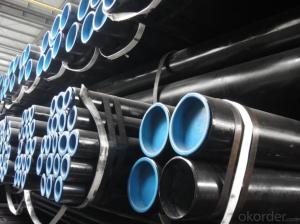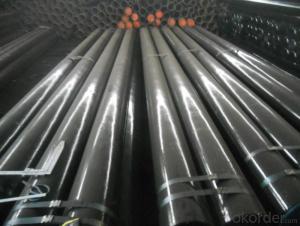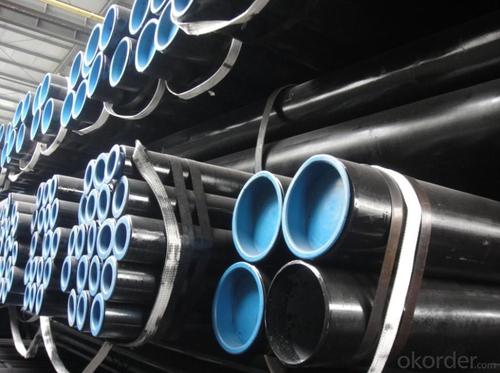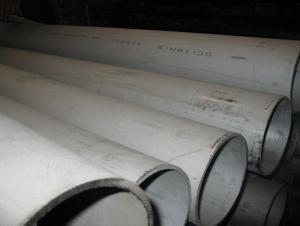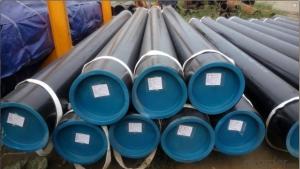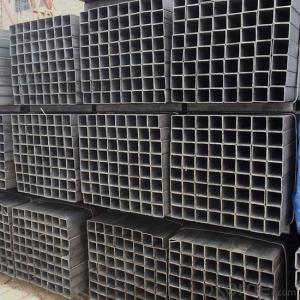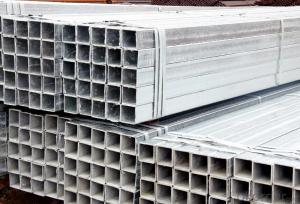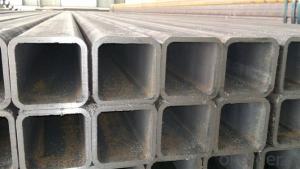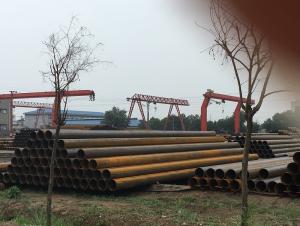Seamless hot rolled black steel pipe Gr.B
- Loading Port:
- Tianjin
- Payment Terms:
- TT OR LC
- Min Order Qty:
- 10 m.t.
- Supply Capability:
- 10000 m.t./month
OKorder Service Pledge
OKorder Financial Service
You Might Also Like
1. Commodity Name: Seamless steel pipe
2. Standard: API,GB,ASTM,ASME,DIN
3. Quality grade: 10#, 20#, A106B, A53B, API 5L B, Q235, Q345, ST37-2, ST 45, ST52.etc.
4. Dimension:
OD: 1/2"-24"
WT: 2.5-80mm, SCH10~SCH40~XXL
length: 5.8m,6m,8m,9m,12m
5. Technique: Hot Rolled/Cold Rolled/ Cold Drawn
6. application
carbon seamless steel pipes are widely used in gas, water and oil, transpotation;constructions;Bridge,highway,windows of model steel door; building materials;fences;heating facilities Fluid Pipe;conduit pipe,scaffolding pipe.etc.
7. Payment Terms: L/C D/A D/P T/T
8.packing and shipment
Packaged in bundles,as per customers' requirements, it can also bepackagesd as beveled ends, typed marking, black painting, plastic caps protection,woven bags packing
For 20" container the max length is 5.8m; For 40" container the max length is 12m. other options are available based on customer requests. Please discuss when placing orders.
9. Surface: painted with varnish;
10. Plastic caps at ends.
11. Tolerance: OD +1%/-1%
WT +12.5%/-10%
12. Chemical composition:
Models of Steel Pipes | Chemical Component | |||||||
Steel 20 (ASTM A106B) | C | Si | Mn | P | S | Cu | Ni | Cr |
0.17~0.24 | 0.17~0.37 | 0.35~0.65 | 0.035max | 0.035max | 0.25max | 0.25max | 0.25max | |
Steel45 (ASTM 1045) | 0.42~0.50 | 0.17~0.37 | 0.50~0.80 | 0.035max | 0.035max | 0.25max | 0.25max | 0.25max |
16Mn(Q345B) | 0.12~0.20 | 0.20~0.55 | 1.20~1.60 | 0.035max | 0.035max | 0.25max | 0.25max | 0.25max |
45Mn2 ( ASTM1345) | 0.42~0.49 | 0.17~0.37 | 1.40~1.80 | 0.035max | 0.035max | 0.3max | 0.3max | 0.30max |
- Q: What is the average cost of steel pipes?
- The average cost of steel pipes can vary significantly depending on factors such as size, grade, and quantity needed. Therefore, it is difficult to provide a specific average cost without more information.
- Q: How do steel pipes handle extreme temperatures?
- Steel pipes are highly durable and can handle extreme temperatures due to their inherent strength and heat resistance. They have a high melting point, allowing them to withstand both very high and very low temperatures without compromising their structural integrity. Additionally, steel pipes have excellent thermal conductivity, which enables them to efficiently transfer heat and prevent damage caused by extreme temperature fluctuations.
- Q: SC15 what does galvanized steel pipe look like?
- Zinc plating: galvanized steel pipe hot galvanized and galvanized two kinds, hot galvanized, zinc coating thickness, with uniform coating, adhesion, long service life and so on. The cost of galvanizing is low, the surface is not very smooth, and the corrosion resistance of itself is much better than that of galvanized pipe. Refer to
- Q: What are the different types of steel pipe coatings for underground applications?
- The different types of steel pipe coatings for underground applications include fusion bonded epoxy (FBE), polyethylene (PE), polyurethane (PU), and coal tar enamel (CTE).
- Q: Can steel pipes be used for water distribution networks?
- Yes, steel pipes can be used for water distribution networks. Steel pipes are commonly used for water distribution due to their durability, strength, and resistance to corrosion. They can efficiently handle high water pressure and are suitable for both underground and above-ground installations. However, proper protective coatings are necessary to prevent rusting and maintain water quality.
- Q: What are the different sizes of steel pipes available?
- Steel pipes are available in a wide range of sizes, varying from small diameter pipes used for plumbing applications to large diameter pipes used for industrial purposes. The sizes typically range from 1/8 inch to 72 inches in diameter, with various wall thickness options.
- Q: Are steel pipes suitable for underground irrigation pumping?
- Yes, steel pipes are generally suitable for underground irrigation pumping. They are durable, resistant to corrosion, and can withstand high pressure. Additionally, steel pipes provide excellent flow capacity, ensuring efficient water distribution for irrigation purposes.
- Q: Why should the weak electricity be pre buried with galvanized steel pipe?
- Galvanized steel is widely used in construction, machinery, coal, chemical industry, railway vehicles, automobile industry, highway, bridge, container, sports facilities, agricultural machinery, petroleum machinery, prospecting machinery and other manufacturing industries.
- Q: What are the common applications of steel pipes?
- Steel pipes have a wide range of common applications in various industries including oil and gas transportation, plumbing systems, structural support in construction, irrigation systems, and industrial processes such as water and wastewater treatment.
- Q: How are steel pipes used in the construction of underground parking garages?
- Steel pipes are used in the construction of underground parking garages for various purposes, including providing structural support, serving as conduits for utilities such as water and electricity, and facilitating drainage systems. They are often used as deep foundation elements to support the weight of the structure and the vehicles above. Additionally, steel pipes are commonly used for installing fire suppression systems, ventilation systems, and plumbing connections within the parking garage.
Send your message to us
Seamless hot rolled black steel pipe Gr.B
- Loading Port:
- Tianjin
- Payment Terms:
- TT OR LC
- Min Order Qty:
- 10 m.t.
- Supply Capability:
- 10000 m.t./month
OKorder Service Pledge
OKorder Financial Service
Similar products
Hot products
Hot Searches
Related keywords
